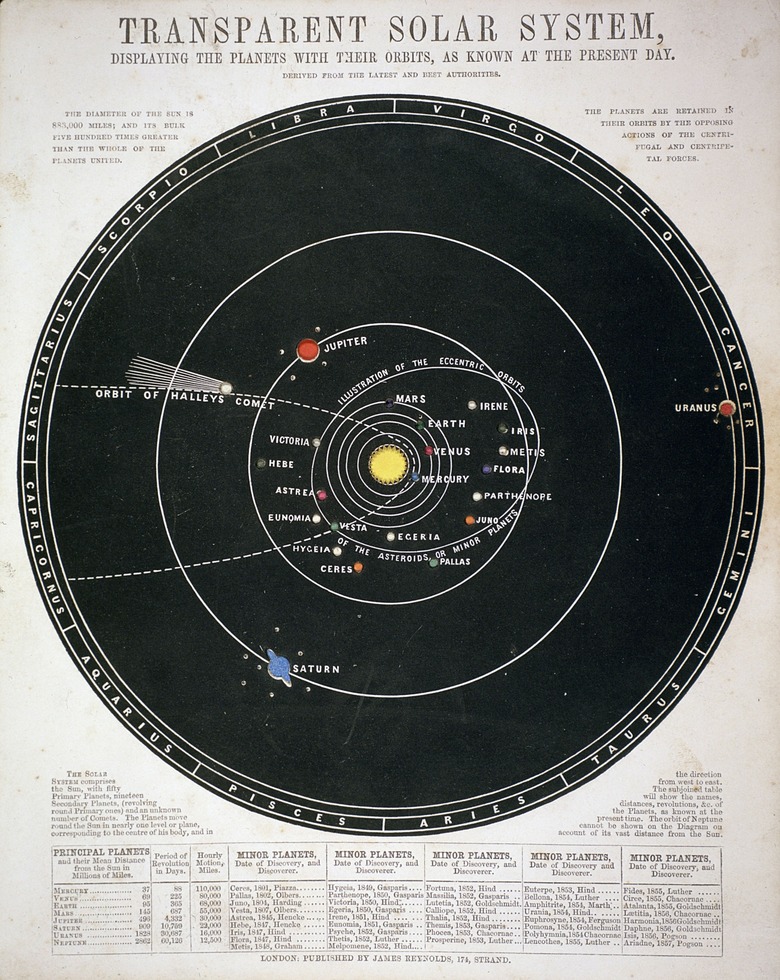How Does The Solar System Affect The Earth?
The solar system has inner and outer layers, the inner being made up of the sun, Mercury, Venus and Earth, and the outer being made up of Mars, asteroids and miscellaneous space debris. Although these planets are light-years away from each other, each planet has very distinct effects on the others. The position, physical qualities and orbit of each planet affect the Earth in several measurable ways.
Big Bang Theory
Big Bang Theory
What's estimated to be 15 billion years ago, according to Visionlearning, an organization that the National Science Foundation funds, the universe exploded in what is known as the big bang. The big bang theory states that the energy of this explosion unified the chemicals involved, creating the matter and energy that would be the solar system, as well as time itself. It was during this explosion that gravity was created and the exact formation and orbit of each planet was set. According to this theory, the shape, orbit and chemical makeup of the earth is affected and affects every other planet in the solar system since the occurrence of the big bang. Earth exists as a life-sustaining planet because of the chemicals and energy that contributed to this explosion. While this model theory is the most popular in evolutionary science, other scientific and religious theories exist to combat it.
Climate
Climate
According to ScienceDaily, changes in Earth's shape over time, coupled with gravitational actions from other planets in the solar system, directly affect the climate on Earth. As these two factors change, the pattern of sunlight across Earth's surface changes. The gravitational pull of Saturn and Jupiter in particular has changed Earth's axial tilt, affecting the way sunlight falls and therefore Earth's climate.
Night and Day
Night and Day
The Earth's place in the solar system, as well as the speed with which it rotates, create 24-hour Earth days, time zones, and night and day as human beings know it. The gravitational pull of each planet affects the spin and rotation of each other planet. Because of this arbitrary speed with which Earth rotates, the human species and other living creatures on Earth have developed their daily patterns during daytime and nighttime hours.
Orbit
Orbit
The gravity of the sun keeps Earth and every other planet in its orbit. If the sun weren't in a perpendicular position to the Earth, the Earth would travel in a straight line rather than an elliptical orbit. The fact that the earth orbits as it does creates life on Earth as we know it, keeping us and every other object on Earth rooted to the ground, experiencing nighttime and daytime hours on a consistent basis and so on. If the Earth was not pulled into orbit by the sun, it would eventually hit another planet or object in space and be destroyed.
Cite This Article
MLA
Monet, Michael. "How Does The Solar System Affect The Earth?" sciencing.com, https://www.sciencing.com/solar-system-affect-earth-10027301/. 24 April 2017.
APA
Monet, Michael. (2017, April 24). How Does The Solar System Affect The Earth?. sciencing.com. Retrieved from https://www.sciencing.com/solar-system-affect-earth-10027301/
Chicago
Monet, Michael. How Does The Solar System Affect The Earth? last modified March 24, 2022. https://www.sciencing.com/solar-system-affect-earth-10027301/
